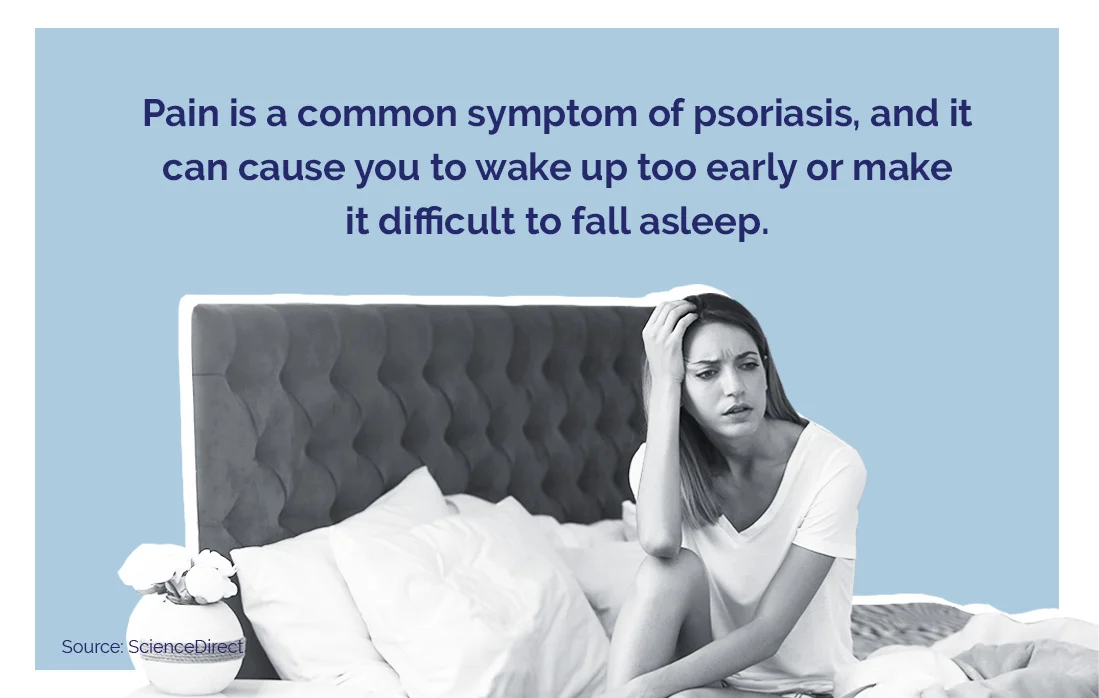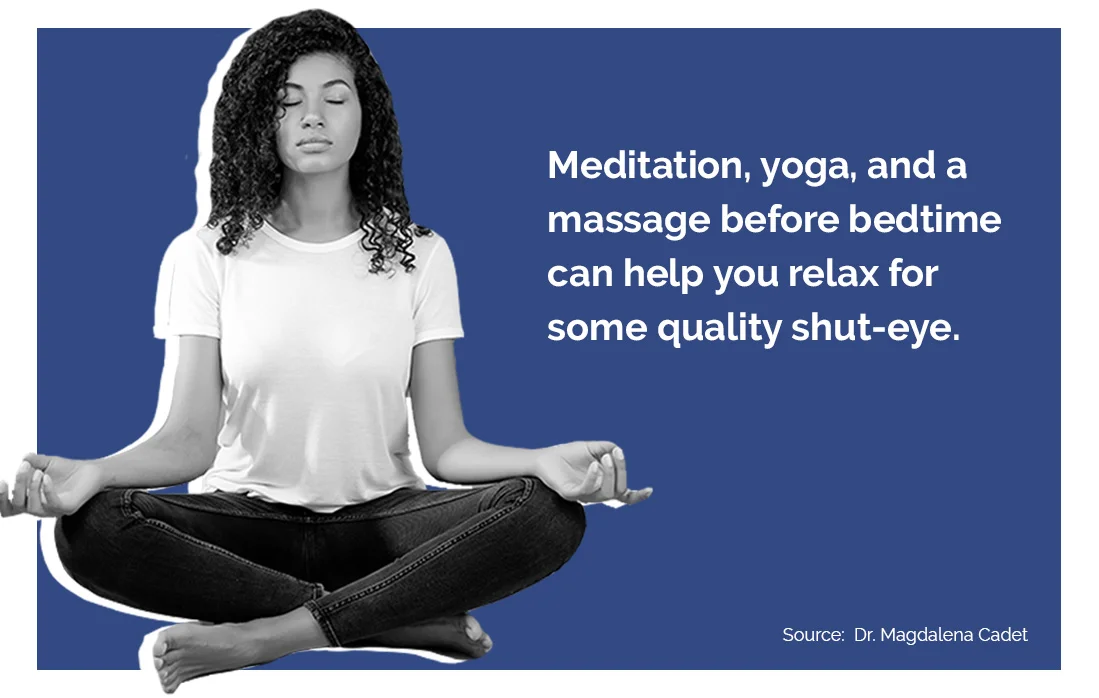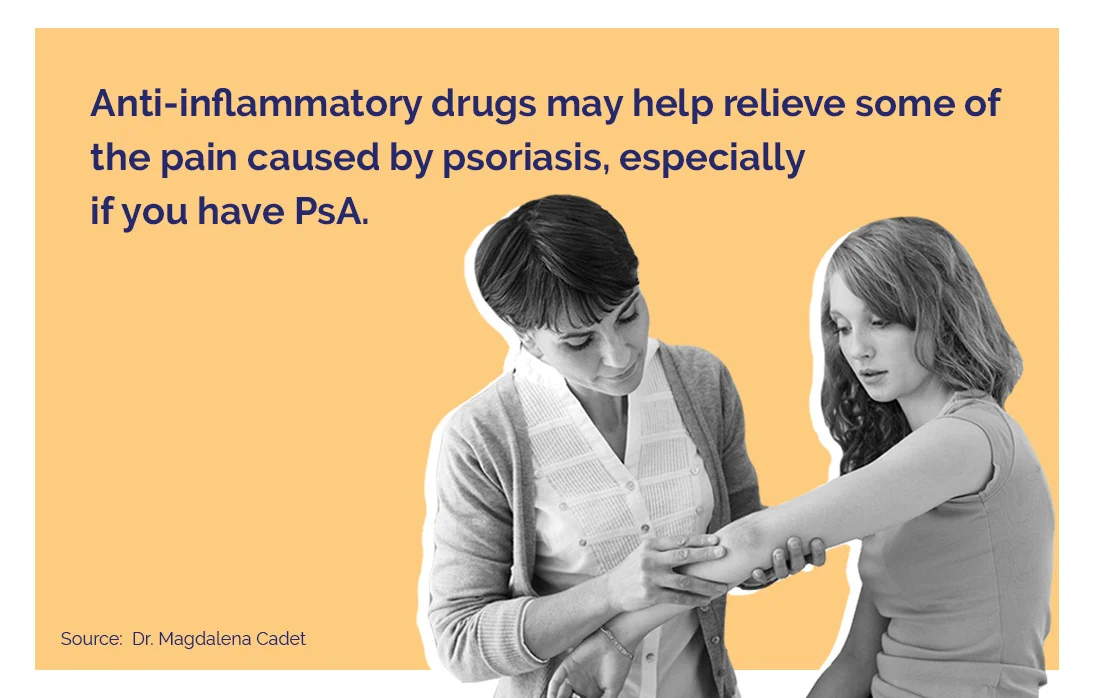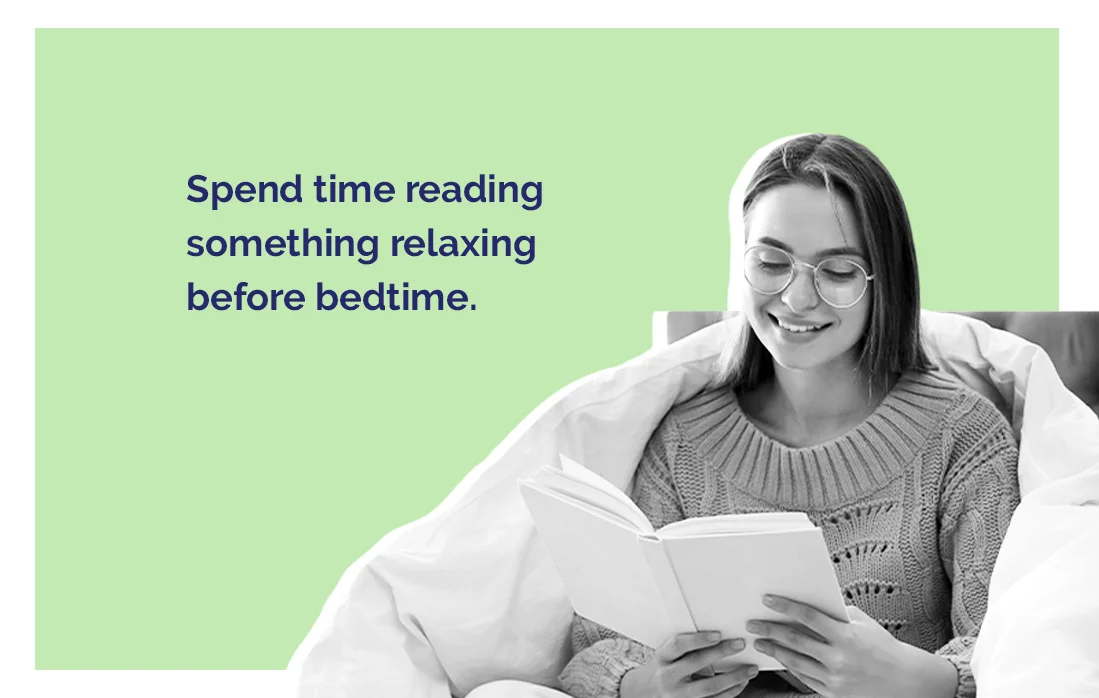Psoriasis won’t help you (or your loved one) sleep better, but it doesn’t mean you’ll never be able to get a good night’s sleep. In this article, I’ll provide some tips from medical experts on how you can improve your quality of sleep with psoriasis.
First, I’ll discuss the connection between psoriasis and sleep. Next, I’ll talk about ways you can sleep better with psoriasis. Finally, I’ll give an overview of psoriasis as well as the associated condition, psoriatic arthritis (PsA).
Note: The content on Sleepopolis is meant to be informative in nature, but it shouldn’t take the place of medical advice and supervision from a trained professional. If you feel you may be suffering from a sleep disorder or medical condition, please see your healthcare provider immediately.
Connection Between Psoriasis and Sleep
Pain is a common symptom of psoriasis, and it can cause you to wake up too early or make it difficult to fall asleep. (1)
People who have psoriasis often don’t sleep as well as those who don’t. (2) Unfortunately, lack of sleep can make psoriasis inflammation worse by wearing down your immune system, creating a difficult cycle for those struggling with psoriasis-induced sleep issues. (3, 4,)

Dr. Anna Chacon, board certified dermatologist at My Psoriasis Team, says that the itching from psoriasis can prevent people with this condition from getting enough quality sleep. And without this rejuvenating sleep, she says psoriasis plaques can spread.
Many people with psoriasis also suffer from arthritis, which can also disrupt sleep. In fact, people with psoriatic arthritis (PsA) are more likely to experience sleep disorders, as their pain can be much more severe than psoriasis pain. (5) According to one study, 38% of folks with PsA frequently experience sleep disturbances. (6) According to Dr. Magdalena Cadet, a board-certified rheumatologist, PsA increases your risk of other conditions that can disrupt sleep, such as fibromyalgia, restless leg syndrome, and temporomandibular joint (TMJ). She also says obesity is often a condition that accompanies PsA, and it can lead to sleep apnea.
Tips for Better Sleep With Psoriasis
Here’s some good news: There are ways to mitigate the negative effects psoriasis and PsA can have on your sleep. Let’s dive into a few tips from medical experts.

Meditate and Massage
Dr. Cadet says meditation, yoga, and a massage before bedtime can help you relax for some quality shut-eye. If you don’t have someone who can give you a massage, she says you can use massage devices or roll certain muscle groups on a tennis ball or foam roller. She also recommends the use of white noise machines and keeping your bedroom cool and quiet.
Practice Healthy Sleep Habits
Healthy sleeping habits can help you catch better Zzzs, even with psoriasis. According to the National Psoriasis Foundation, you should consider adopting the following habits:
- Make sure you get at least seven hours of sleep, which may mean going to be earlier
- Go to bed and wake up at the same time, even on weekends
- Create a relaxing bedtime routine so that you get nice and sleepy before turning off the lights
- Use your bed only for sleep and sex
- Turn off electronics at least an hour before you go to bed
- Exercise often and maintain a healthy diet
- Stay away from caffeine and alcohol before bedtime (7)
Dr. Cadet provides a few additional healthy sleeping habits:
- You should keep your air moisturized with a humidifier and apply moisturizing creams and lotions after you shower to help with psoriasis.
- Apply ice packs to swollen joints and psoriasis patches to help with any irritation.
- Keep your room dark and avoid having stimulating lights that can come from electronic devices.
You should be sure you’re sleeping on the right mattress, such as a hypoallergenic or latex mattress. Healthy habits before bedtime are great, but when it comes time to sleep, you’ll likely want a mattress that keeps you comfortable and cozy. You may also want to consider using an extra pillow at night. Dr. Cadet suggests placing a pillow under your knees or shoulders to alleviate discomfort. In addition, she recommends exploring adjustable bed options, as these may be able to help alleviate pressure on sensitive joints, such as those at the knees or hips.
Talk to Your Doctor about Medications
Before we get into using drugs as a psoriasis and PsA treatment, I want to note that you should talk to your doctor before taking anything. Psoriasis treatments are going to depend on how severe the disease is for you, so there is no “one-size-fits-all” treatment.

That said, anti-inflammatory drugs may help relieve some of the pain caused by psoriasis, especially if you have PsA. Dr. Cadet suggests asking your doctor about medications such as ibuprofen or Naproxen to help with inflammation. Dr. Chacon recommends speaking to your doctor about over-the-counter antihistamine medications, such as Benadryl, to relieve discomfort and inflammation.
However, anti-inflammatory drugs won’t slow your psoriasis. If you’re interested in slowing down your psoriasis, one study recommends talking to your doctor about using antirheumatic drugs like Plaquenil or Arava. (8)
If you’re interested in making it easier to fall asleep, rather than in addressing your psoriasis pain, Dr. Chacon recommends speaking to your doctor about sleep supplements, such as melatonin. Sleep supplements can make it easier to fall asleep and stay asleep throughout the night.
You can also try applying topical treatments to your psoriasis patches. Dr. Cadet suggests asking your doctor about topical medications that you can apply before bedtime to help with the itchiness and inflammation. Dr. Chacon recommends using Vaseline petrolatum to help soothe irritated spots.
Try Light Therapy
The FDA says light treatment (or phototherapy) can help treat psoriasis. (9) Phototherapy uses bright fluorescent light from a box or lamp to help your brain make more serotonin, which can boost your mood. (10) Since psoriasis can lead to anxiety and depression, it makes sense that phototherapy could reduce some of the negative effects of psoriasis. And being less anxious can help calm your mind so you can get high-quality sleep.
Read before Bedtime
Dr. Chacon recommends spending time reading something relaxing before bedtime. Personally, she likes to read about traveling prior to nodding off, but you can choose anything that helps your mind relax. So, if you’re able to relax reading a scary Stephen King novel before bedtime, go for it! For the rest of us, some lighter reading may work better.

Consider Alternative Treatments
Alternative treatments might also help relieve psoriasis symptoms and help you sleep. Here are a few to consider:
- Use aloe extract cream daily over a month-long period to see if your skin improves
- Take fish oil supplements
- Partake in aromatherapy with essential oils
- Apply Oregon grape (barberry) to your skin (11)
About Psoriasis (and Psoriatic Arthritis)
If you suffer from psoriasis, you’re likely familiar with how it causes dry, itchy splotches on your skin. These patches can often show up on your scalp, elbows, and knees. (12) Dr. Chacon says, “The itching can be unbearable, and the scaling can be annoying and embarrassing, often leaving a trail of white dust.”
Psoriasis affects about 3% of people in the US and impacts both men and women equally. Having psoriasis increases your risk of anxiety, depression, and sleep disturbances. (13) It’s a long-term condition that inflames the skin, and it can (understandably) negatively impact sufferers’ mental health because of the itching, pain, and the associated lack of quality sleep. (14)
Approximately 25% of folks with psoriasis have PsA. (15) PsA sufferers contend with the joint pain of arthritis in addition to the itchy, scaly spots of psoriasis.
Dr. Cadet says there are multiple symptoms of PsA, including neck and lower back pain, decreased range of motion and flexibility, and nail pitting and discoloration. She also says, “There can be joint pain, swelling and prolonged stiffness (lasting more than 1 hour) of small joints like hands/fingers and feet but [PsA can] also involve large joints like your hips and knees as well as your spine.” In addition, Dr. Cadet notes that PsA can lead to inflammation in the heel, ankle, or elbow.
Last Word From Sleepopolis
Psoriasis and PsA don’t have to be synonymous with poor sleep. Healthy habits like meditation, light therapy, and reading before bedtime can all help you sleep better with these conditions. I hope this article gave you some helpful techniques for improving your sleep with psoriasis. Please remember that we are not medical experts, so be sure to speak with your healthcare provider if you have any medical questions.
References
- Gupta, M et al. Psoriasis and sleep disorders: A systematic review. Sleep Medicine Reviews. Oct 2016.
- Nowowiejska, J et al. The Assessment of Risk and Predictors of Sleep Disorders in Patients with Psoriasis-A Questionnaire-Based Cross-Sectional Analysis. Journal of Clinical Medicine. Feb 9, 2021.
- Halioua, B et al. Influence of Skin Subjective Symptoms on Sleep Quality in Patients with Cutaneous Disorders: A Study of 2871 Subjects. Clinical, Cosmetic and Investigational Dermatology. Feb 11, 2021.
- Lu, F et al. The Effect of Shift Work and Poor Sleep on Self-Reported Skin Conditions: A Survey of Call Center Agents in the Philippines. Clocks & Sleep. Feb 24, 2019.
- Krajewska-Włodarczyk, M et al. Sleep disorders in patients with psoriatic arthritis and psoriasis. Reumatologia. Oct 31, 2018.
- Haugeberg, G et al. Psoriatic arthritis: exploring the occurrence of sleep disturbances, fatigue, and depression and their correlates. Arthritis Research & Therapy. Aug 26, 2020.
- Nowowiejska, J et al. The Assessment of Risk and Predictors of Sleep Disorders in Patients with Psoriasis-A Questionnaire-Based Cross-Sectional Analysis. Journal of Clinical Medicine. Feb 9, 2021.
- Halioua, B et al. Influence of Skin Subjective Symptoms on Sleep Quality in Patients with Cutaneous Disorders: A Study of 2871 Subjects. Clinical, Cosmetic and Investigational Dermatology. Feb 11, 2021.
- Lu, F et al. The Effect of Shift Work and Poor Sleep on Self-Reported Skin Conditions: A Survey of Call Center Agents in the Philippines. Clocks & Sleep. Feb 24, 2019.
- “The Mind, Body and Sleep Relationship.” National Psoriasis Foundation. Jan 18, 2021. https://www.psoriasis.org/advance/mind-body-and-sleep-relationship/
- Cunha, J et al. Management of Psoriasis and Psoriatic Arthritis in a Multidisciplinary Rheumatology/Dermatology Clinic. Federal Practitioner. Dec 2015.
- “Psoriasis Treatments Are Getting More Personalized.” US Food and Drug Administration. Aug 28, 2014. https://www.fda.gov/consumers/consumer-updates/psoriasis-treatments-are-getting-more-personalized
- Gonsalez, E. “Help for Veterans with Seasonal Affective Disorder.” US Department of Veterans Affairs. Feb 6, 2018. https://www.va.gov/HEALTH/NewsFeatures/2018/February/Help-for-Veterans-with-Seasonal-Affective-Disorder.asp
- “Psoriasis.” Mayo Clinic. https://www.mayoclinic.org/diseases-conditions/psoriasis/diagnosis-treatment/drc-20355845
- Henry, A et al. Measurement, Classification and Evaluation of Sleep Disturbance in Psoriasis: A Systematic Review. PLOS One. Jun 21, 2016.
- Wong, I et al. Sleep Disturbance in Psoriatic Disease: Prevalence and Associated Factors. The Journal of Rheumatology. Jun 2017.
- Henry, A et al. Beliefs About Sleep In People With Psoriasis: An In-Depth Qualitative Study Using The Common-Sense Model Of Self-Regulation Framework. Sleep. Apr 28, 2017.
- Alinaghi, F et al. Prevalence of psoriatic arthritis in patients with psoriasis: A systematic review and meta-analysis of observational and clinical studies. Journal of the American Academy of Dermatology. Jun 18, 2018.

























